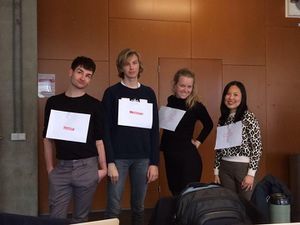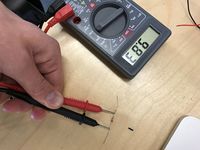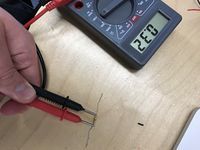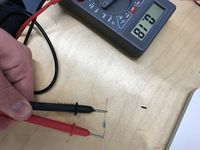Digital Craft 2nd Year
angiethebard@gmail.com
0915620
First Class
I grouped up with Mickey, Axel and Ayo. Denis gave us a lecture about basic electricity. We did a small exercise to show what we learned from the class. We did a small play to show how plus and minus electrons work when they are close and far from each other.
Second Class
We experimented with small circuit boards and batteries.

Battery: -8.78V (We switched around the + and the -, so the reading is in -. But we saw and changed it so it was right, but forgot to picture it.)
Resistance: 470 ohms
Current: 13.8 mA
Measuring Voltage and Current


 9V battery and diode
9V battery and diode
Here we measured the resister.
Volt 1st resistor 9.83 Volt / 2nd 0.32 Volt / 3th 0.18 Volt/ 1th + 2nd together 10.15 Volt / 2nd + 3th together 0,5 Volt / 1th +2nd +3th together 10.83
I = V/R 9,11: 9,83 = 0,93 9,11 : 10.83 = 0,84
We measured the different resisters so we knew the value.
Third Class
To be honest, I missed half of the class because of the unmatched planning on mywdka and wike page. I tried to follow what was going on during the class and Denis explained me what I could do. And then I realised I actually did the similar thing at an open course last year which was about making a circuit that makes noise when you touch. I could also made a noise with water.
Individual Project
I made an weaving loom with LED at quarter 6 at fine art department and decided to develop the work. The concept was about weaving my own tapestry as a traveller. Since I have mainly worked with textile so far and I wanted to make my own textile. I got the idea of weaving a tapestry from a travel to Morocco. I visited Berber people's village and could see many tapestry works of them. They are also nomadic tribe. I have travelled a lot and now I am staying in the Netherlands. Therefore I wanted to describe my identity by weaving a tapestry. The light from the fibres signifies the star constellation, which guides you find the direction when you are lost on trip.
I decided to continue this work for this practice. This time, I wanted to make a wearable object like smart textile. I already had the material "optical fibre". I decided to make a cape which also signifies traveller, and to weave optical fibre through the cape. At the beginning I just wanted to use some LEDs and Arduino to programme some changes in the light as before. But when I talked to the teachers they suggested me to use light sensor "LDR", and I thought it would be awesome. So I decided to make a fibre-woven, lighted cape that interacts with lightness of surroundings.
Circuit and Material

So I asked Thomas for help to make a circuit. I could get the light source from the package with optical fibre. I also measured the voltage and current of each R, G, B lines and white wire for + but forgot to take pictures..
From the result of measurement, I could know which transistor and resistor I need for this circuit.
3 x BD139 transistor for each R, G, B lines
3 x 360 ohm resistor for each R, G, B lines
1 x 10K ohm resistor for Arduino
1 x LDR (Light sensor)
First I tried with breadboard and then it worked properly. Then I soldered the actual circuit.

However, when I took this to the last class and tried out if it works, there was a problem with the LDR-resistor part. When I tried to plug the voltage pin on Arduino it got really hot. Denis explained to me it was because I connected the voltage and ground so it was making a very short circuit. So I changed the connection between LDR and resistor. Then it started to work, but the value of LDR was not changing that significantly. It was in between 974-1024. So I asked Thomas and he said there is another error again.

However, even after I fixed the circuit, LDR was working the same and for some reason, Red light was not working. I think I broke the transistor while I was soldering. Same thing happened to me before when I was soldering too long and too hot. So I had to give up some of my original plan. My original plan was to make the light brighter in the dark and after I realised the red light was not working, I wanted to programme like when it's dark, there is more Blue value and when it gets lighter it has more green value. But then LDR was not working. So I dropped the idea of programming complicated. I just put the blue and green light together all the time. Then finally it worked!

There were many small mistakes during the process but to summarise what I failed are:
Use of LDR
Complicated programming
I kind of pushed myself to try out more complex circuit than I did before. But unfortunately not everything worked out as planned. But still, I learned new things such as how to prevent making a short circuit, how to measure voltage and current to know the right resistor, and I also vaguely remember DC and AC therefore I need a transistor. I still want to try to fix the circuit to accomplish my original goal and revise all new things I learned from the process.
I still need to put the picture of my end result. It's trippy.










